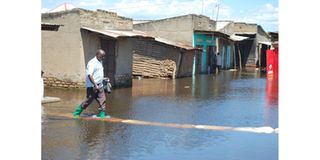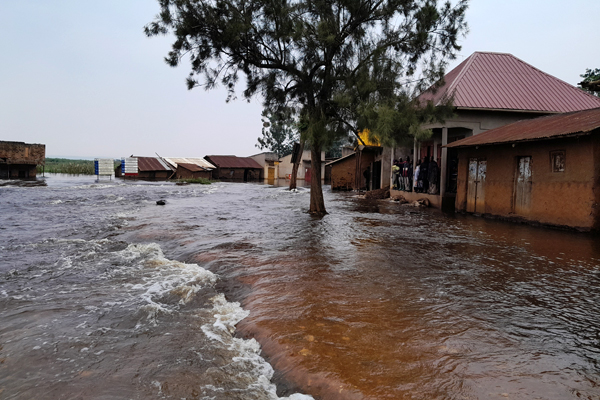Prime
Lwera floods displace over 200 households

A man walks through a flooded section of Kamuwunga Landing Site in Kalungu district on January 3, 2023. PHOTO | RICHARD KYANJO
What you need to know:
- A report by the Natural Resources Parliamentary committee of 2016 revealed that human activities had affected fish stocks within Lake Victoria since Lwera wetland acted as a breeding area.
Flash floods have displaced about 5,000 people from 200 households at Kamuwunga Landing Site in Lwera, Kalungu District.
According to Mr Ronald Ssemanda, the chairperson Kamuwunga Landing Site, Lake Victoria water levels have risen in recent months, resulting in floods along the shores and surrounding areas, including Lwera swamp. The floods have destroyed homes, killed animals and also submerged gardens.
“The floods have so far destroyed 10 houses and many are on the verge of collapsing. We will have serious health problems if the floods also submerge the pit-latrines.” Mr Ssemanda told this publication in an interview on Wednesday.
He said the affected residents have so far relocated to Nabyewanga village in Mpigi District and Lukaya Town Council, Kalungu District.
Mr Deus Mubiru, a resident of Kamuwunga landing site, said flash floods are a new phenomenon in the area, and blames sand miners and rice growers for degrading the lake.
He said the floods started two weeks ago after persistent heavy rains for nearly three months.
Mr Mubiru said: “I have been here for 28 years. We started experiencing floods in 2010 when sand mining began and we have tried to talk to the concerned authorities, but nothing has been done.”
Government Directive
While addressing local leaders in Masaka District on July 23, 2019 during his countrywide wealth creation tour, President Museveni warned rice growers in Lwera against destroying the wetland . He said degrading the wetland is ‘kisirani’ (loosely translated to mean a curse).
Mr Museveni said wetlands are part of public land which should not be owned by individuals.
In 2020, State minister for Environment ,Ms Beatrice Anywar echoed the presidential directive, insisting that even those owning residential houses in Lwera had to vacate.
However, in disregard of all these directives, people have refused to vacate Lwera wetland.
A report by the Natural Resources Parliamentary committee of 2016 revealed that human activities had affected fish stocks within Lake Victoria since Lwera wetland acted as a breeding area.
Ministry of Environment statistics show that Uganda has lost more than 30 percent of the wetlands in the last 20 years.
Meanwhile, about nine people in Rakai District were confirmed dead and more than 200 were displaced after Lake Kijjanebarola submerged their homes last week. At least four people died and two are still missing.
Wetland history
Lwera swampstretches about 20kms on the Kampala–Masaka highway, and is a major water catchment area that connects several rivers and wetlands in Gomba, Mpigi and Kalungu districts and drains directly into Lake Victoria .
Due to its strategic location along the Kampala –Masaka highway, Lwera swamp has in the past decade attracted many investment companies and individuals who are engaging in sand mining, fishing farming and crop growing.



